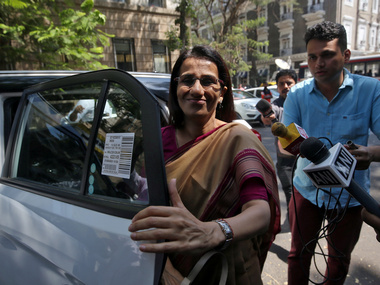The quid pro quo loan case involving ICICI Bank corporate loan and financial transactions between former CEO Chanda Kochhar’s husband, Deepak Kochhar and Videocon Group’s founder, chairman and managing director, Venugopal Dhoot was seen as having met its end with the bank sacking Kochhar following the probe findings of the Justice Srikrishna panel. But it didn’t. With Kochhar moving the Bombay High Court and it taking cognisance of her arguments against her former employer, the court will now look into the nuances of the infamous quid pro quo deal. That will also put the spotlight back on ICICI Bank board’s controversial approach to this case from day one to the date of Kochhar’s sacking. The case, it appears, is far from over. Kochhar has approached the HC citing the fact that her termination was executed without getting the consent of the banking regulator, the Reserve Bank of India. Also, it is pertinent to note the fact that Kochhar was earlier given permission for a voluntary exit by the bank. While the legal validity of her arguments and the bank’s actions are up to the judiciary to decide, there are serious questions that have been left unanswered in this case to this point. Before looking at those, let’s understand what the case is all about . [caption id=“attachment_6647791” align=“alignleft” width=“380”]  File photo of Chanda Kochhar, former ICICI Bank CEO Chanda Kochhar. Reuters.[/caption] At the heart of the matter is a sequence of loan/investment transactions among ICICI Bank, Videocon Group and Chanda Kochhar’s husband Deepak Kochhar’s firm that was floated as a joint venture with Venugopal Dhoot. In 2008, Dhoot floated an equal joint venture with Deepak Kochhar, the husband of ICICI Bank MD and CEO Chanda Kochhar, lent Rs 64 crore to the firm and eventually transferred the entire stake to Kochhar. But that is one side of the story. In 2012, ICICI lent Rs 3,250 crore to the Videocon group companies, as part of a Rs 40,000 crore consortium loan deal. The allegation is that the two are connected and that this is a quid pro quo deal. In a separate clarification, the ICICI Bank, Videocon’s Dhoot and Deepak Kochhar’s firm categorically denied charges of any wrongdoing. In 2016, Arvind Gupta , a shareholder of both the Videocon group and ICICI Bank, mailed a detailed letter to authorities, including to the Prime Minister’s Office, narrating a suspicious sequence of financial transactions between ICICI Bank, the Kochhars and Videocon’s Dhoot. The letter, dated 15 March 2016, sought investigation into illicit banking and commercial transactions involving Dhoot and the Kochhars. It alleged that for wrongful personal gains both parties acted in a non-transparent manner with respect to certain financial transactions. Firstpost couldn’t independently verify any evidence that suggests a quid pro quo deal between the Kochhars and the Videocon group.
The problem ICICI bank may face now is this: The first time the case caught public attention, ICICI Bank and its board had fiercely defended Kochhar without carrying out a detailed probe into the merits of the case. It consistently maintained that the loan in question was given to Videocon as part of loan syndication involving other banks. That argument was technically right; it was a consortium that gave the loan. But, the recurring question was this: Why did the ICICI board fail to notice the clear conflict of interest caused due to Kochhhar’s presence in the credit approval process?
Had Kochhar recused herself from the committee that sanctioned the loans to Videocon or if the bank had a waterproof system in place to check for cases of conflict of interest involving top management participating in large loan deals, this case would not have developed into a controversy of this scale and magnitude. Instead, the board’s response, post-allegations, was surprising. Following the allegations against Kochhar, the ICICI board responded immediately by issuing a clean chit to Kochhar and rallied behind her to downplay the arguments. It was only after intense media scrutiny and public attention that the bank later agreed to form an internal panel to probe into the matter. The question is: Why was the board in a hurry to give a clean chit to Kochhar initially? Another important question is, why did the ICICI board accept her resignation even before the probe was over? Couldn’t it have waited till the probe into the issue was completed? The Board of ICICI Bank could have handled the Kochhar issue better. The writing was on the wall for Kochhar ever since the allegations first came to light. The charges against her and her family members pertaining to the misuse of the CEO’s office were serious in nature. Whether there is truth in the charges or not; the board and Kochhar should have tread cautiously considering that the bank’s first commitment is to its depositors and shareholders and not to one of its top management employee.
Clearly, there are reasons to believe that the golden rules of good corporate governance standards were not honoured in the ICICI Bank-Videocon loan case. The actions of the bank’s board, in this case, have left many critical questions unanswered.
With Kochhar challenging the bank’s actions in Court, these questions are likely to return to the spotlight again.


)

)
)
)
)
)
)
)
)



